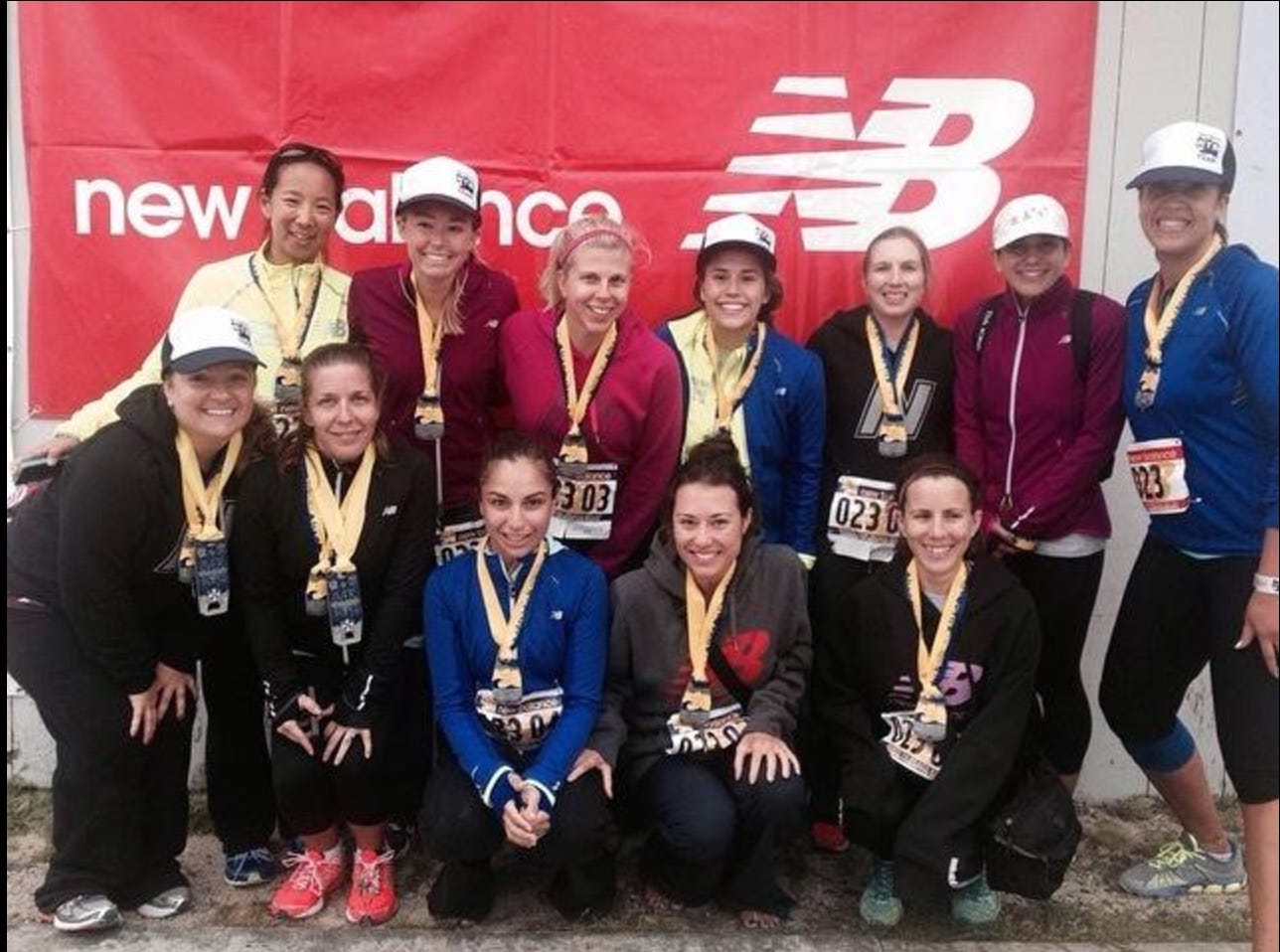What I wouldn’t give for a straightforward plan
Wait, I thought you were supposed to have figured out who you are by your 40s?
A couple of months ago, I logged into Facebook. I barely check that social media platform so it’s not unusual for me to be served up a memory to try to entice me to come back more regularly. Remember all the fun things you used to post here? It’s usually some mundane thought or some photo of the kids doing something I thought was cute. (Why did I ever think other people would be interested in this?)
On this day, the picture Facebook showed me was from 2014. It was a photo from the finish line of Reach the Beach, a roughly 200-mile relay from the White Mountains to the beach in New Hampshire. It was a photo of me and the 11 women looking a little tired and dirty after our 30ish hour adventure.
10 years ago today.
That photo made me realize that it’s been about 10 years since I felt like a runner and when I felt like I was in the best running shape of my life. When I felt like I could call myself a runner without adding a bunch of qualifying statements. Then, I did the stupid thing of looking back at my photos from that period, specifically my workouts because yes, I moved on from posting mundane thoughts on Facebook to posting workout, running, and yoga pictures on Instagram.
The thing that struck me most was how running felt easeful then. Not that it was easy all the time but that it was something intrinsic to me. That I knew it was something that I could just head out the door and do.
These days, I often find myself trying to make a deal — with whom, I have no idea — but it follows this general line of thinking. What I wouldn’t give to be able to move in my body with ease. What I wouldn’t give for a month of healthy running. To feel good running. To not constantly worry about my body. To not constantly be in pain in some way, shape, or form.
And it’s not even my knee(s). It’s pain in my hip, my back, my neck and shoulder. Sometimes it’s a low discomfort, like a buzzing fly in your ear that you can mostly ignore but you occasionally lash out against. Other times, it’s constant, distracting pain that keeps me from sitting still for any length of time or that wakes me up in the middle of the night. (Hi from my midlife, aging body.)
There’s a part of me that often wonders if it’s time to move on, if that’s what my body is actually trying to tell me. Frankly, it feels embarrassing to spend so much mental and emotional energy thinking about my body and the types of movement I can or cannot do.
It’s silly really.
But it also feels terribly disorienting when I’ve always found so much solace in movement, as a means of joy, a means of feeling like myself. How do you hold on to something you love, that’s meaningful, without holding on too tightly that it escapes your grasp like those squishy water wiggler toys, the ones that continuously slip from your hands?
The other day, I was reminded that it’s been over a year since my knee surgery. It didn’t even cross my mind, which is unusual because I’m typically the type of person that keeps track of everything. I love a good milestone but at some point this year, I just stopped counting. But I completely blew past that anniversary.
It sounds weird but when I realized that I needed another knee surgery, I was oddly OK with the decision because I had been through it twice before. I knew what to expect. I knew what rehab would look like. I knew the timeline. I knew the plan. And if you give me a timeline and a plan, I will perform the shit out of it.
There’s a comfort in having a plan, isn’t there? And there’s a confusion when things don’t go according to plan. This time around, the trajectory hasn’t followed the same path. It’s been longer and had a few setbacks. It’s been slower and I’ve felt less responsive.
What I wouldn’t give for a straightforward plan.
I think that part of the reason I keep thinking about running and my relationship to running is because my identity has shifted in big ways this year, especially when I took a full-time job almost a year ago.
While I still freelance occasionally and I’m still an author, I stepped away from reporting on women’s sports and female athlete health, work that has defined a big part of my life and career, maybe even part of the reason you signed for this newsletter in the first place. It feels weird to leave that world behind after spending so much time carving out a specific niche for myself. My day-to-day work now involves science communication, which a big part of what I loved about my job as a journalist and something that feels even more urgent now.
But the job change has left me scrambling to try to figure out who I am. It’s most obvious when I meet someone new and they ask me about my job and I don’t know how to answer that simple question. Do I work in communications? Am I still a journalist?
I think that part of the reason that I have a hard time grappling with this job (career?) change is because my career as a journalist gave me a purpose and identity apart from being a mom and wife in a way that I didn’t experience in my previous life in the nonprofit sector. Maybe because I was wholly creating the work—they were my words built on my research and my ideas. Maybe because it was work that challenged me and forced me to lean in the my creativity, something that I’ve always been intimidated by and convinced that I wasn’t good at.
But I also recognize that that career played into parts of my personality that aren’t necessarily healthy, especially my addiction to the productivity hustle. I’m still vulnerable to those tendencies and after experiencing burnout, I’m really hesitant to push myself in ways that get me close to that edge again. And the lower level of stress that I experience on a day-to-day basis is 100% worth it.
As I was writing this, I texted a friend to say that I’m terrible at wrapping up these newsletters. I feel like I have to come up with some neat and tidy takeaway, which always feels hard.
So I’ll just leave you with this. I know that I’m not going to figure it all out or that I’ll have a tidy epiphany in time for some arbitrary anniversary. I also don’t want to force a conclusion or hold that water wiggler toy too tightly anymore because my relationship to my career and my body and my sport will always evolve. It has to.
Links & Things
So far, I’m liking the experience over at Bluesky and I appreciate that my feed is chronological and that the platform doesn’t surpress links like some others.
This podcast on women’s sports, sex testing and the question of who should be able to participate in sport was really good. After listening to this episode, you should listen to Tested from Rose Eveleth. And really, bans on trans athletes affect all levels of sports and makes it harder for any one to play even recreationally.
There’s an interesting new study that looks at the relationship between fueling and performance among 2022 Boston Marathon runners. They found that 42.5% women and 17.6% men had at least one indicator of low energy availability, meaning that they were under-fueling and not meeting their body’s needs.
These runners had slower times, worse finishing place, a higher risk of needing medical attention during the race, and a higher risk of injury/lost training days compared to runners who met their body’s energy needs.
The researchers also found that there was no significant relationship between BMI and low energy availability, meaning any BODY can be at risk, not just one specific body type.
There was also no relationship between BMI and performance. There's no specific body type that makes you a better runner.
Here’s more on under-fueling and relative energy deficiency in sport.
Maybe this explains my (more) recent aches and pains? (gift link)
If you’ve ever wondered about the process of designing activewear, here’s an interview for you.
Thanks for being here. More soon.
Christine










I feel this, on so many levels.
I appreciated reading this!